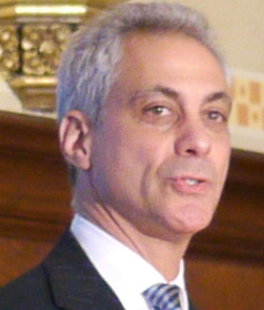Checks and Balances- Just Keep Writing the Checks Chicago

Photo Courtesy of WIkimedia Commons
Mayor Rahm Emanuel’s proposed $588 million tax hike would support police officer’s and fire fighter’s pension funds.
Mayor Rahm Emanuel has proposed a hefty tax hike for Chicago: $588 million to cover pensions and salaries of police and firefighters. If approved, property owners would be required to pay new garbage removal fee, additional taxes for e-cigarette products would be put in place and the cost of taxi fares would increase.
Garbage removal
Chicago is a densely populated area and trash accumulates quickly. Paying $5-$10 more for garbage removal is not ideal, but it could be justified, especially if Chicagoans could be confident that garbage removal and disposal was being managed in a sustainable and environmentally conscious manor.
E-cigarettes
Why single out this cohort of people based on their personal choices and behavior? To clarify, reported data varies in excess regarding the amount of carbon emitted by e-cigarettes contributing to green-house gasses. Major carbon emissions come from agriculture, industrial by-products, and vehicle emissions to name a few. Many brands of e-cigarettes have been shown to emit amounts of carbon particulate about as potent as an exhalation from a set of adult human lungs.
Another side of the card for raising taxes on e-cigarettes argues that the increase would supposedly deter minors from using e-cigarette products. Then again, how are they gaining access to these products? More importantly, how many rebellious adolescents under the age of 18 are budgeting their vices and voting on tax increases? Bottom line: It is the duty of the parental guardians and educators to lay the framework for healthy living and wise personal choices in Chicago’s youth.
Taxi transportation services
Though it may be difficult to envision the back seat of a taxi being a luxury, it is something to be considered, in a similar sense to e-cigarette products being an elective purchase. However, the latter would only be the case, if public transit were available/functioning, affordable and not overcrowded.
Public transportation is highly encouraged by the Chicago Department of transportation. On the City of Chicago website it reads “We (The Chicago Department of Transportation) encourage you to take public transportation whenever possible!” But is public transportation always a viable alternative to paying the extra dollar or two for taxi fares in the middle of winter — or on a hot summer day?
The answer teeters depending on social class and demographic. Though Chicago is home to the country’s second largest public transportation system, serving the city of Chicago and 40 neighboring communities, there are numerous regions of the city poorly accessible through public transportation — and that number triples by midnight.
Revenue could add up quickly for those who rely on taxis when the weather or crime rates make commuting by foot or bike dangerous. Someone who utilizes three taxi rides a week, at an increased rate of $2/ride, will pay an additional $24/month or $288 annually. This of course, assumes three cab rides a week is standard, this varies with many factors. For the sake of recognizing the other side of the coin, taxi cabs are often used by those who are able to spare a few bucks.
Emanuel’s proposed tax hike does not appear to be intended to benefit education, pollution control or consumer protection. Though it does seem to subtly threaten (or imply the potential neglect of) the safety and well-being of Chicago’s students, residents and consumers. Revenue generated from these three taxes is proposed to fill what are apparently some very large holes in the pensions of police and firefighters that are coming due.
Also apparent is the implication that firefighter and police pensions are projected to continue increasing in coming fiscal years, as they have in the past.
What if Emanuel’s tax proposal is shot down? Would pensions that were promised not get paid into, it goes without asking that in this case, police and firefighter forces will likely see major staffing cuts and budget slashing. For many reasons, including fear inducing cases of police brutality, cops are the last people (one would think) we want to shortchange — police brutality does occur in Chicago.
So, assuming that police officers and firefighters with crappy hours, minimal pay and shrinking pensions want to stick their neck out for the population on a daily basis, as their pay and benefits continue to dwindle this is a bit like entrusting someone you just robbed to watch your baby or elderly parent.
Quality civil service comes with a price, just as everything else. But fostering quality for civil services in Chicago could be more vigilantly monitored and addressed than it has been in previous years.
By proposing such a robust increase in revenues for pensions and salaries, Emanuel seems to elude to the idea that the only way to ensure firefighters and law enforcement are supported by their employer (the city) in good conscience, in the years following 2015, is if city revenue increases by $588 million.
Perhaps there were major short-comings in previous years accounting for pension and salary. Accountability seems to waver endlessly in the windy city, but it can only be further exasperated if effective management of expenses continues to remain on the back burner of political agendas.
Your donation will support the student journalists of Northeastern Illinois University's The Independent, either in writers' payment, additional supplies and other items of note. Your contribution will allow us to purchase additional equipment for writers/photographers/illustrators and cover our annual website hosting costs.



